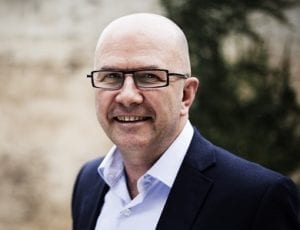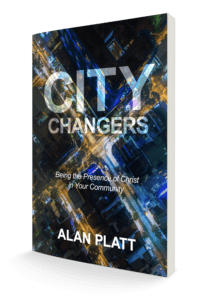 Alan Platt, chief architect of Church United in South Florida, and leader of the global Doxa Deo Church and the City Changers Movement begun in South Africa, has authored a brand new book, released by David C. Cook publishers, entitled City Changers. What follows are Alan’s thoughts and an excerpt from the book.
Alan Platt, chief architect of Church United in South Florida, and leader of the global Doxa Deo Church and the City Changers Movement begun in South Africa, has authored a brand new book, released by David C. Cook publishers, entitled City Changers. What follows are Alan’s thoughts and an excerpt from the book.
Because of the conviction that we are called to be the presence of Christ in our cities and communities, I felt compelled to put pen to paper, trusting that this book would be a contribution to empower both leaders and disciples in the Christian community to better understand how to thrive within a very broken and sometimes hostile world.
In the book we address, amongst other things, the following:
- A theological framework to understand our engagement within the world
- A discipleship framework to practically raise and mobilize “City Changers”
- The key elements in creating the alternative Kingdom culture that will affect the world we are in
- An understanding of Missional Unity between Kingdom life-giving institutions in a geographical area
- A few stories of impact in various spheres of society
Chapter 8, titled “Transforming Together,” focuses primarily on what God is doing through the Church United in the South Florida region.
Here are a few excerpts from that chapter.
 No one church or ministry, no matter how large, can make a dent in the lostness, pain, and brokenness of the region on their own. Among pastors, there is a growing realization that their local churches cannot do the job alone. However, they have often been frustrated in their attempts to come together in a concerted effort. There is great pressure on them from within to make their own churches a success. Many leaders are on the verge of burnout, many times comparing their situations to the perceived successes of ministries around them. Many of them don’t understand how to take care of their own souls, so the last thing they want to do is add another obligation, especially one not focused on their own church’s needs.
No one church or ministry, no matter how large, can make a dent in the lostness, pain, and brokenness of the region on their own. Among pastors, there is a growing realization that their local churches cannot do the job alone. However, they have often been frustrated in their attempts to come together in a concerted effort. There is great pressure on them from within to make their own churches a success. Many leaders are on the verge of burnout, many times comparing their situations to the perceived successes of ministries around them. Many of them don’t understand how to take care of their own souls, so the last thing they want to do is add another obligation, especially one not focused on their own church’s needs.
Several churches in the region gained new pastors during this time — young, humble, and magnanimous leaders. They created a new sense of hope and anticipation that a new season had dawned, and this sparked a fresh desire to reach across denominational and other divides. In the divine providence of God, some of the seasoned leaders who had already been faithfully serving in this region also came on board, which lent credibility to this process.
We established a process, called Church United, in which we can facilitate engagement between churches and ministries on three levels, represented by the terms connect, collaborate, and celebrate.
Connect — creating unity — facilitate opportunities for leaders to discover, dialogue, and do life and outreach together.
Collaborate — catalyzing action — identify spiritual, social, and cultural goals that can be reached more effectively together.
Celebrate — cultivating transformation — measure the positive outcomes of these efforts on the culture and the region.
To maximize our impact on our communities, as church leaders and members, we need to make the following shifts:
- From concern to compassion
- From condemning your city to seeking the peace and prosperity of it
- From building walls to building bridges
- From measuring attendance to measuring impact
- From encouraging to equipping
- From local minister to regional spiritual leader
- From positioning against to joining hands
- From shared activity to shared goals or outcomes
Perhaps you have heard the African saying, “It takes a village to raise a child.” Your environment, the context in which you live, has a powerful influence on your worldview, your beliefs, your values, and even on your behavior. You are a product of the culture you grew up in.
If it is true that it takes a village to raise a child, then who raises the ‘village’?
Who or what shapes the force that shapes you and me?
Who has the primary influence on our ‘villages’?
Who gives the ‘village’ its values and its primary cultural expression?
If the church is absent in this dialogue, then secular humanistic values will be the primary influence defining our world. We firmly believe the Church, called as an agent of the Kingdom of God, is responsible.
Christianity is a comprehensive, life-giving framework of truth that, when embraced, will have a redemptive effect on the culture.
How can the ‘village’ be rescued? Who or what will it take to raise the ‘village’?
There can be only one answer: It takes the Church to raise a ‘village’!
Spread the word
- Become an advocate within your own sphere of influence by making people aware and encouraging them to read the book.
- Share the release news through Facebook, Twitter, Instagram or other social media. Please tag @AlanPlattFC on Twitter and @alanplattofficial on Facebook.
- Post a review of the book on your favorite online retailer or Goodreads.
- Host Alan, as the author, on your podcast, blog, or Periscope, through a Facebook Live Video, or any other media channel. (Schedule a time by connecting with me at [email protected])
- Promote the message by promoting it as an online/event give-away. I can make 3 books available if you are willing to do this.
-
 Purchase the book at bookstores, on Amazon.com, and at AlanPlatt.org.
Purchase the book at bookstores, on Amazon.com, and at AlanPlatt.org.

Comments